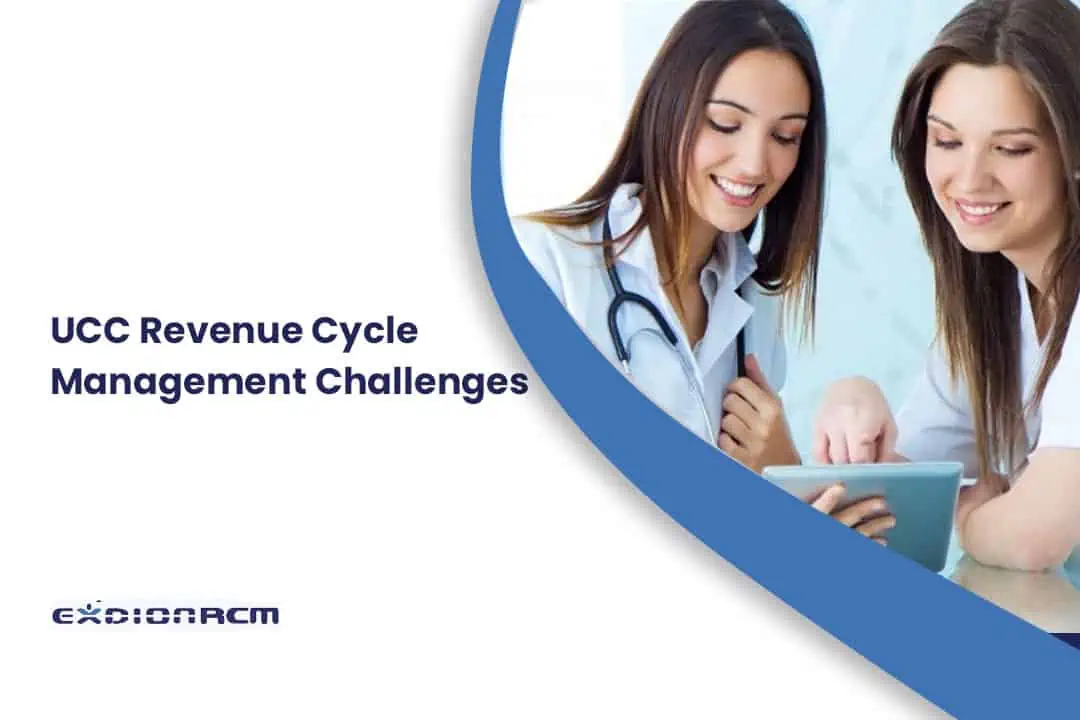
UCC Revenue Cycle Management Challenges
A recent National health insurer study reported that around 20% of the claims paid are incorrect. In addition, healthcare providers have to endure a loss of approximately 4%-12% of their income.
This is what makes optimized medical coding & billing essential for Urgent Care Centers (UCC). When done correctly and on time, these activities can help establish a smooth revenue cycle. The challenge is, it demands extreme caution as it directly impacts the UCCs income.
To enable ensured reimbursement, the UCC needs medical coders and billers who are experts in denial resolution, claim follow-up, bill adjustments and claim appeal submission. This isn’t as easy as it seems. Sooner or later you realize that manual coding does not scale and you face challenges with sub-optimal coding.
That is just the beginning. Here are the other challenges:
Compliance Standards
Protecting a patient’s personal information from a data breach is not just important but a legal requirement. A UCCs revenue cycle management strategy must work in sync with the Healthcare Information Portability and Accountability Act 1996 (HIPAA). Health care fraud and abuse laws mandate penalties that can severely impact your UCCs financial health.
HIPAA Compliance Mandates:
- Medical Codes Standardization
- Regular compliance audit of the UCC
- Electronic filing of medical claims
- Secure workstations
- Restricted access to medical records
- Secure access to coding platforms
All healthcare providers need to safeguard the privacy, security, and confidentiality of protected health information (PHI) by following all the guidelines and mandatory protocols of HIPPA.
System Interoperability
Information Technology (IT) can save an enormous amount of time and cost by speeding up the exchange of information between different healthcare systems. When physicians, clinicians, and doctors have access to patient data in an integrated workflow, it speeds up processes. Interoperability, however, is still a challenge for some healthcare providers and UCCs where data is locked into platforms that don’t work well with others.
The biggest culprit is legacy systems at UCCs. A focus on standardized healthcare terminology, usable interfaces for all your processes and tools can help with interoperability and alleviate IT challenges. It can also help stay ahead of the continuous changes and updates when it comes to medical coding standards and regulations. It can enable a free and smooth flow of information across doctors, UCCs, labs, patients, and pharmacies.
The business side of Urgent Care
There are key non-medical aspects of the UCC revenue cycle such as insurance verification, medical coding and billing, claims processing and follow-up, collections, appeals and reimbursements. Every UCC spends a substantial amount of resources and time on improving the workflow of these administrative tasks that are essential for revenue integrity.
These cross-disciplinary tasks are tedious, time-consuming, error prone and require expertise, resulting in ineffective UCC revenue cycle management.
A more effective and efficient strategy is to separate these administrative tasks such as medical coding and billing and engage an expert healthcare revenue integrity partner for help.
Ensuring Optimized Cash Flow
According to the American Medical Association (AMA), around 10% of the claims are not paid accurately. Consistent cash is a barometer of the financial health of the UCC. If the accounts receivables are sorted, a UCC does not have to be concerned. On the other hand, if you are facing challenges with your accounts receivables, you need to take the appropriate measures to increase the collections to boost cash flows.
Once again, you can start with identifying the key components of your UCCs revenue cycle by partnering with an expert UCC revenue cycle management service provider.
RCM Analytics
RCM analytics is the application of Business Intelligence methodologies to the performance of healthcare providers such as UCCs. These strategies can help you optimize time, revenue, health informatics and more. The harsh reality is that most UCCs are not equipped to capture this treasure trove of valuable, insightful data. The reliance on legacy tools and inexperienced service providers, or unavailability of technical know-how is to blame.
UCCs can save an enormous amount of time and manual effort by automating data gathering. The data can be used to automate administrative tasks as well as digging deep revenue cycle challenges. There is another area where an expert Revenue Integrity and Cycle Management Company can empower UCCs with the analytical tools to derive accurate, actionable insights.
Reducing A/R days
One of the most effective ways to improve UCC revenue cycle management is by enhancing claim submission processes. Keeping a track of A/R days isn’t as easy as seems. However, the lower the days in A/R, the faster the provider gets paid, thus maximizing revenue.
Creating benchmarks on the age of claims is a common strategy that works well. Keeping A/R days below 50 is ideal, anything beyond 90 and it is time to follow up.
Enhance your UCC revenue cycle with Exdion Health
At Exdion Health, we help UCCs overcome revenue cycle management challenges. With a stellar track record, having delivered a wide range of successful services and solutions, we are trusted RCM experts.
Get in touch with us to learn how your UCC can join hands with us towards a modernized, effective, cost-effective revenue cycle management partnership.


